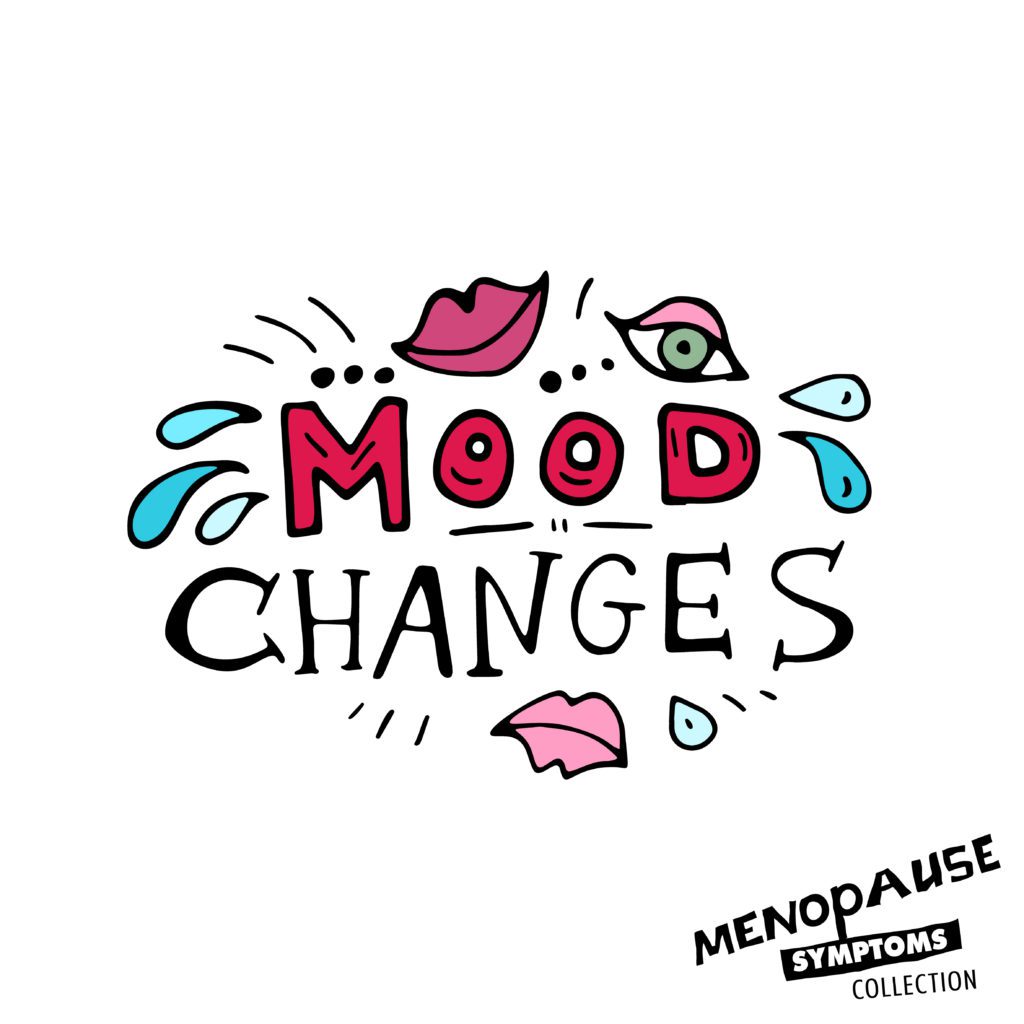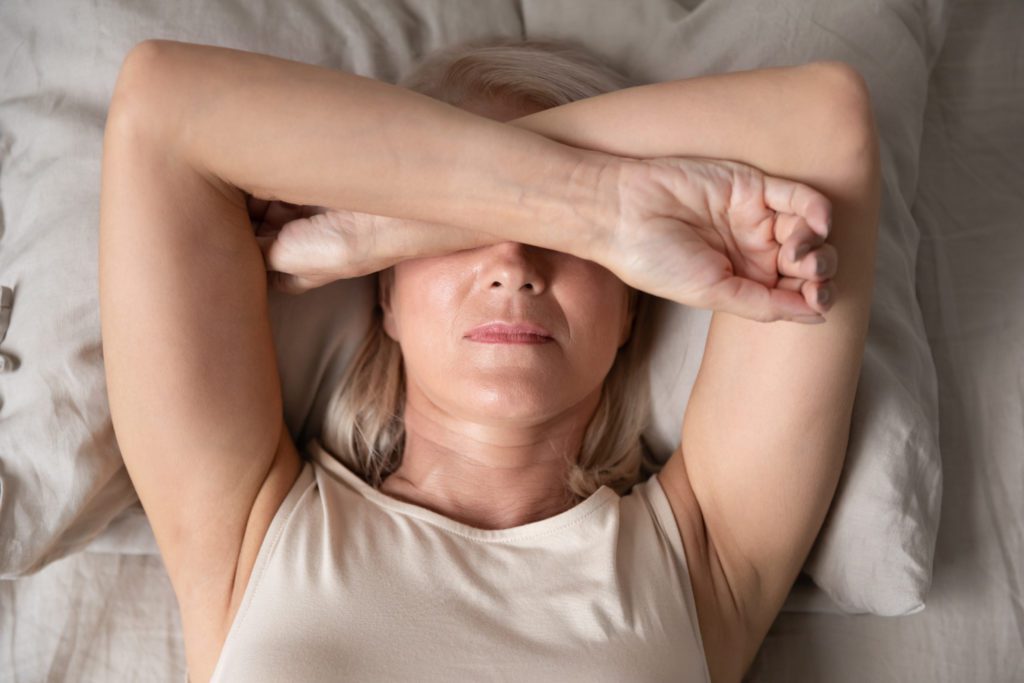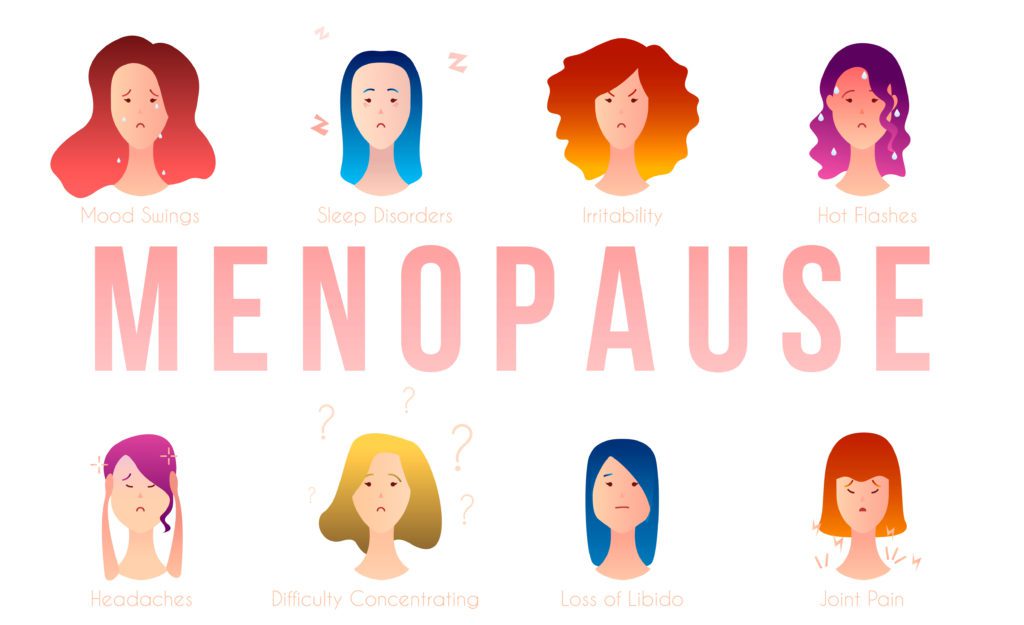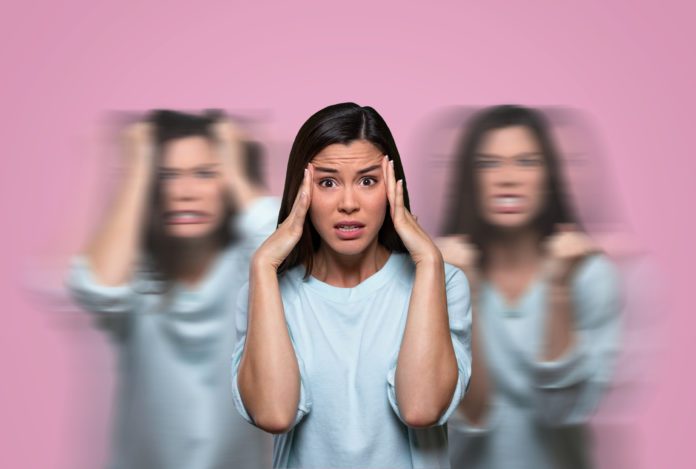If you’re going through menopause and you’re struggling with mood swings, you’re not alone. Surprisingly, mood swings are the second most common side effect the average woman will experience during menopause and occur as a result of the hormonal changes taking place in the body. However, there are many different ways you can help to ease the intense changes in your mood during this time, either alone or with the help of a doctor. And in this article, we’re going to talk all about them.
From your diet to supplements, here’s our complete guide to mood swings during menopause and how you can ease them to help your mood stay as balanced as possible.

What Are Menopause Mood Swings?
To start off, menopause is a time in a woman’s life when her ovaries stop producing estrogen and progesterone around her late 40s to 50s. As this change occurs, the decrease in hormones can cause the woman to have a variety of negative side effects, including hot flashes, insomnia, and even mood swings. Surprisingly, around 70% of women have described irritability as their main emotional problem during the early stages of menopause, making mood swings one of the most common side effects alongside hot flashes.
Mood swings can vary per woman but are most often described as sudden feelings of sadness, anger, frustration, or depression. Oftentimes, women who are struggling with mood swings will also have issues remembering things, which can contribute to their moodiness. However, not all women will experience such a severe change in their mood during menopause, while some women, on the other hand, are at a higher risk of having them. Those at a higher risk typically are women with:
- A history of depression
- Extreme or high levels of stress
- Poor physical health (poor diet, overindulging in alcohol or substances)
With that said, mood swings during menopause are quite common and can mess with a woman’s mental health in an extremely negative way. For that reason, these emotional changes are not something to be taken lightly and should be handled with extreme care as they arise.

Causes of Menopause Mood Swings
When it comes to the causes of mood swings during menopause, the main cause comes directly from the decrease of estrogen in the body. This is because estrogen naturally helps to regulate several hormones and keep them balanced, including serotonin (the happy hormone), norepinephrine (the sleep-wake cycle), and dopamine (the feel-good hormone). When estrogen decreases, these hormones directly connected with the mood become disrupted and unbalanced, which can lead to a variety of abrupt mood swings without any visible reason.

How Long Do Mood Swings Last?
When it comes to the question of how long mood swings will last, once in menopause and into postmenopause, the symptoms may continue for an average of four to five years, but they are believed to also decrease in frequency and intensity over time. Some women, however, have reported that their symptoms have lasted longer than the average, which is always a possibility as well.

Ways to Treat Menopause Mood Swings
Next, when it comes to the question of how to treat mood swings during menopause, there are a variety of ways to help ease the effects. Diet change, exercise, and mindful practices are all examples of ways to combat this. Here’s a brief overview of some of the best ways to ease changes in your mood during menopause.
Medical Treatments
The first way to treat mood swings during menopause is with medications or hormone therapy. Here’s a brief overview of some of the most common treatments for this.
1. Hormone replacement therapy (HRT)
Starting off, the treatment believed to be the most effective in relieving menopause side effects such as hot flashes and mood swings is hormone replacement therapy. Hormone replacement therapy (HRT) is where women take certain medications that contain estrogen to help better regulate hormone levels and to help relieve their menopausal symptoms. Hormone therapy was once widely used to treat the symptoms of menopause, but it was later found to increase certain health risks and should be used cautiously. For that reason, it is extremely important to talk with your doctor prior to use.
2. SSRIs
Next, SSRIs (also known as selective serotonin reuptake inhibitors) are also believed to be an effective way in treating menopause mood swings and other symptoms, such as hot flashes. The job of SSRIs is to increase the amount of the neurotransmitter serotonin (the happy hormone) in your brain, which ultimately helps to contribute to a more positive mental state. Doctors often prescribed SSRIs before other treatments, as they are known to have the fewest side effects.
3. Antidepressants
Next, antidepressant medications are often used for women in menopause to help with the reduction of hot flashes and night sweats, although they have also been used to treat other side effects of menopause, such as mood swings. When used in low doses, many women have reported an increase in their mood and a reduction in other symptoms.
However, antidepressants do pose a large number of side effects as well, such as dizziness and nausea, and are important to discuss with your doctor prior to taking them.
Supplements
Next, if you’re looking for a more natural way to treat your mood swings in menopause, natural and herbal supplements may be worth trying. Here’s a list of a few of the most common supplements taken for menopause mood swings.
1. St. John’s wort
The first common supplement often used for mood swings is St. John’s wort. St. John’s wort has been shown in studies in some cases to help ease depression and mood problems as a much healthier alternative to antidepressants. However, talking to your doctor about any and all risks is essential before you try taking any herbal supplements to ensure they are the right fit for you.
You can read more about the effects of St. John’s wort and other herbal supplements in regards to menopause here.
2. Vitamin D
Next, Vitamin D supplements have also been used to help ease menopause symptoms as well as play a role in moderating many body processes. And on top of it’s benefits for menopause, Vitamin D has also been linked with helping to prevent heart disease, osteoporosis, and other diseases. Foods that contain Vitamin D that you may want to keep an eye out for include:
- Fish
- Cheese
- Egg yolks
- Orange juice
- Soy milk
However, as with any other supplements or medication, you should talk to your doctor about the appropriate amounts of Vitamin D you should have daily in order to keep your body healthy and thriving. Getting around 15 minutes of sunlight each day is also an effortless way that can also help you maintain a healthy level of Vitamin D.
3. Vitamin E
Next, Vitamin E is also known to reduce the severity and frequency of perimenopausal hot flashes and other symptoms. Its high antioxidant properties also help to lower your chances for depression and anxiety, which can help you to maintain a more positive mindset. With that said, you may want to consider eating foods high in Vitamin E content, such as:
- Nuts
- Seeds
- Spinach,
- Broccoli
You can also take over-the-counter multivitamins that contain the recommended daily amount of Vitamin E. However, make sure you consult your physician prior to taking it to ensure Vitamin E supplements are right for you.
4. Vitamin B-6
Next, Vitamin B-6 (also known as pyridoxine) is a supplement that helps to keep the nervous system thriving as well as help with the production of serotonin, also known as the ‘happy hormone.’ As women age, the serotonin levels naturally begin to drop, which can make women more prone to mood swings and depression, which is another reason this is common during menopause. Therefore, taking Vitamin B-6 supplements during and after menopause may help prevent symptoms caused by low serotonin levels.
However, Vitamin B-12 may also impact blood sugar levels and blood pressure levels, which can make it difficult to take if you have diabetes. For that reason, you should talk to your doctor prior to using it to ensure you are fit to take additional supplements such as this.
5. Omega-3 fatty acids
And lastly, Omega-3 fatty acids are believed to offer a variety of benefits when it comes to menopause. It is believed that Omega-3 fatty acids can help to decrease everything from your risk of depression to hot flashes and other menopause-related symptoms. Foods that contain high levels of Omega-3 fatty acids include:
- Fish
- Nuts
- Oils (such as canola oil, flaxseed oil, or soybean oil)
- Eggs
- Chia seeds
- Edamame
As you can see, there are a wide variety of natural supplements that are believed to be able to help you reduce and or ease mood swings during menopause. However, it is important to consult your doctor or physician prior to taking any new medications or supplements, as well as changing your diet in order to make sure your body is getting the necessary daily intake it needs without posing you any risks.
Additional Tips
And finally, on top of the treatments and supplements mentioned above that you can use to try to help improve your mood swings, here are a few additional tips and tricks that may also help you out.
1. Get exercise
The first tip is to exercise. For easing menopause symptoms in general, exercising is highly recommended. It is believed that exercising for around 30 to 60 minutes a day times a week may help to alleviate several menopausal symptoms, including night sweats, irritability, and mood swings. This is because, when you exercise, you release endorphins, often referred to as the ‘feel-good’ hormones, which can trigger a positive reaction in your brain. For this reason, it can help you maintain a more positive mental state, which can reduce the chances of irritability and mood swings.
So whether you choose to walk, bike, or swim, exercise is always one of the best natural ways to help improve your mood and ease irritability, as well as promote positive health overall.
2. Eat healthy food
Next, as mentioned before, you definitely want to watch what you eat during menopause. This is because certain foods can trigger symptoms to get worse, such as spicy foods with hot flashes, and can be avoided by carefully selecting what you eat. With that said, it is believed a diet containing healthy and fresh foods, such as vegetables, fruits, lean protein, and whole grains, is more likely to give your body omega-3 fatty acids and other essential nutrients that may help improve your mood.
However, as with any other diet changes, talking to your doctor about proper nutrition is always the way to go to ensure you can find a diet that suits your needs best.
3. Try to let go of stress
Next, de-stressing is another one of the easiest and most effective natural ways to help ease menopause symptoms from the comfort of your own home. This could include yoga, meditation, reading, or taking walks in nature to help improve your mood and decrease stress. With that said, you can also try experimenting with deep breathing exercises and mindful practice that help you be more present in the moment to get your body feeling more calm and relaxed.
Overall, you’ll definitely want to make your mental health a priority, especially during menopause, to help ease any anger, depression, or other changes in your mood.
4. Make sleep a priority
Next, sleep should always be a priority, but especially during menopause, as not getting enough sleep can also add to irritability and mood swings. For that reason, you’ll want to make sure you’re doing everything you can to ensure you’re getting enough sleep. This includes sticking to a regular nighttime routine, creating the right ambiance in your room for sleep, and or taking naps throughout the day.
You’ll want to aim to sleep for at least 7 to 8 hours a day to allow proper healing and repair of your immune system as well as help to ease irritability. Therefore, make sure you plan accordingly to get the proper amount of sleep each night to limit the effects of mood swings.
5. Cut back on drinking
Next, another common tip that is often recommended for women going through menopause is to stop drinking. Many times, when women are trying to cope with the high levels of stress and anxiety they are experiencing during menopause, they tend to turn to alcohol or other substances as a way to ease their effects. However, this may actually be doing more harm than good and may be contributing to many other problems during menopause. Therefore, now more than ever is an excellent time to cut back on the drinking to help ease your symptoms.
6. Talk to a therapist
And lastly, you may want to consider talking to a therapist to help you ease your mood swings. Research has shown that women are extremely susceptible to depression during, before, and after menopause, more so than any other time in their life. In fact, one study found that you’re more likely to have depression symptoms once you enter perimenopause.
With that said, if you’re experiencing a lot of sadness and anxiety, it is always good to consider seeing a psychiatrist or doctor for clinical depression, as lifestyle changes, medications, and supplements may not be entirely effective in helping you to feel better.

Conclusion
Overall, mood swings are one of the most common side effects of menopause and can leave you feeling angry, confused, and frustrated more often than not. No matter what you choose to do to help ease your symptoms, we hope this article has given you some insight into how to work through and improve your mood swings for a healthier mental state to help your menopause cycle run as smoothly as possible.
Sources:
https://www.webmd.com/menopause/guide/emotional-roller-coaster
https://www.hormone.org/diseases-and-conditions/menopause/menopause-mood-swings
https://www.everydayhealth.com/menopause-pictures/ways-to-even-out-menopause-mood-swings.aspx
https://healthtalk.org/menopause/emotions-and-the-menopause-mood-swings-anxiety-and-depression


